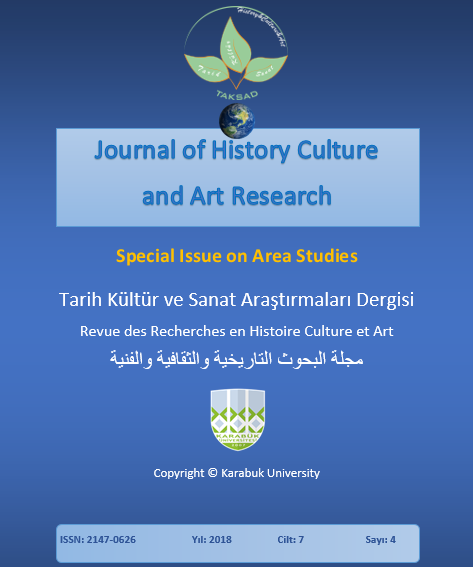The Causes of Political Violence and Terrorism on the Verge of the XX-XXI Centuries: The Basic Approaches
DOI:
https://doi.org/10.7596/taksad.v7i4.1836Abstract
One of the main problems of modern socio-political relations is the escalation of violence, which takes on a mass character and spreads even in the once safe regions of the world. In this regard, a special research interest is the identification of the causes of political violence in the form of terrorist actions. The objective of this paper is to characterize the main approaches of Western researchers to determine the causes of political violence and terrorism in public life at the turn of the XX and XIX centuries, and to reveal the influence of various factors on the spread of political terrorism in the modern world. The main approaches to the study of the problem posed were the analytical method and content analysis. The paper shows that the natural causes of social tension and growth of terrorist movements should be eliminated with the help of educational and socially oriented policies of the state and the world community of nations as a whole. The materials of this paper can help further study the specifics of political violence and take preventive measures against terrorism by power structures and law enforcement agencies.
References
Ball-Rokeach, S. J. (1973). “Values and violence: A test of the subculture of violence hypothesis” American Sociological Review, No. 38, pp. 736-749.
Bandura, A. (1976). “Social learning analysis of aggression”, Analysis of delinquency and aggression. New York: John Wiley and Sons, 1976.
Corrado, R. & Evans, R. (1988). “Ethnic and Ideological Terrorism in Western Europe” The Politics of Terrorism. edited by M. Stohl, New York: Dekker.
Dementiev, I. V. (1991). "The phenomenon of political terrorism: a conceptual aspect", Sociological Research, No.11, pp. 47-52.
Dennen, V. J. & V. Falger, V. (1990). Sociology and conflict: Evolutionary perspectives on competition, cooperation, violence and warfare. London: Chapman and Hall.
Erlanger, H. S. (1974). “The empirical status of the subculture of violence thesis”, Social Problems, № 22, pp. 280-292.
Grachev, A. S. (1982). "Political terrorism: the roots of the problem." M.: Knowledge, pp. 4-6.
Hewitt, C. (1984). The Effectiveness of Anti-Terrorist Policies. Landham, MD: University of America Press.
Huston, A. C. et. al. (1992). Big world, small screen: The role of television in American society, Lincoln: University of Nebraska Press.
Josephson, W. L. (1987). “Television violence and children’s aggression: Testing the priming, social script and disinhibition predictions” Journal of Personality and Social Psychology, No. 53(5), pp. 882-890.
Kaftan, V. V. & Naidina. T. B. (2013). "Discursive practices of modern terrorism in the information and communication space." Space and Time, No.3 (13), pp. 222-230.
Khrapal, L. R.; Doronin, S. P.; Kamaleeva, A. R. & Gruzkova, S. Iu. (2015). "Scientific and methodological support of the implementation of ideas of countering terrorism and extremism in the youth environment", Kazan Pedagogical Journal, No. 1, pp. 1-9.
Kliuev, Iu. V. (2015). "The psychology of mutual understanding in audiovisual media," Humanitarian Vector. Series: Pedagogy, Psychology, No.1 (41), pp. 129-136.
Kudriavtseva, I.S. (2016). "Psychological features of crimes of a terrorist nature", Bulletin of A.P. Chekhov Taganrog Institute, No. 1, pp. 63-69.
Lee, A. (1983). Terrorism in Northern Ireland. New York: General Hall.
Medov, U. M. (2014). "Modern view on the causes of terrorism", Business in law. Economic and legal journal, No.5, pp. 195-197.
Nesmelov, O. V. (1998). "Global problems of our time: the political aspect", Course of lectures on political science. Kazan: Publishing House of KSU, p. 316.
Nielson, F. (1994). “Sociobiology and sociology” Annual Review of Sociology, № 20, pp. 267-303.
O’Connor, J. & Lizotte, A. (1987). “The «Southern subculture of violence» thesis and patterns of gun owership”, Social Problems, № 25, pp. 420-429.
Pinkney, A. (1972). The American way of violence. New York: Random House.
Rubenstein, R. (1987). Alchemists of Revolution. New York: Basic Books.
Van Evra, J. (1990). Television and child development. Hillsdale, NJ: Lawrence Erlbaum Associates.
Vander Zanden, J. (1987). Social psychology, 4-th edition. New York: Random House.
Westie, F. (1964). “Race and ethnic relations”, Handbook of modern sociology, R. E. L. Faris, book editor, Chicago: Rand McNally.
Wolfgang, M. & E. Ferracuti, E. (1986). “Urban response to federal program flexibility: Politics of community development block grant”, Urban Affairs Quarterly, No. 21, pp. 293-310.
Zald, M. N. & McCarthy, J. D. (1987). Book editors, Social movements in organizational society: Collected essays. New Brunswick, NJ: Transaction Book.
Downloads
Published
How to Cite
Issue
Section
License
All papers licensed under Creative Commons 4.0 CC-BY.- Share — copy and redistribute the material in any medium or format
- Adapt — remix, transform, and build upon the material for any purpose, even commercially.
Under the following terms:
Attribution — You must give appropriate credit, provide a link to the license, and indicate if changes were made. You may do so in any reasonable manner, but not in any way that suggests the licensor endorses you or your use.
- No additional restrictions — You may not apply legal terms or technological measures that legally restrict others from doing anything the license permits.







